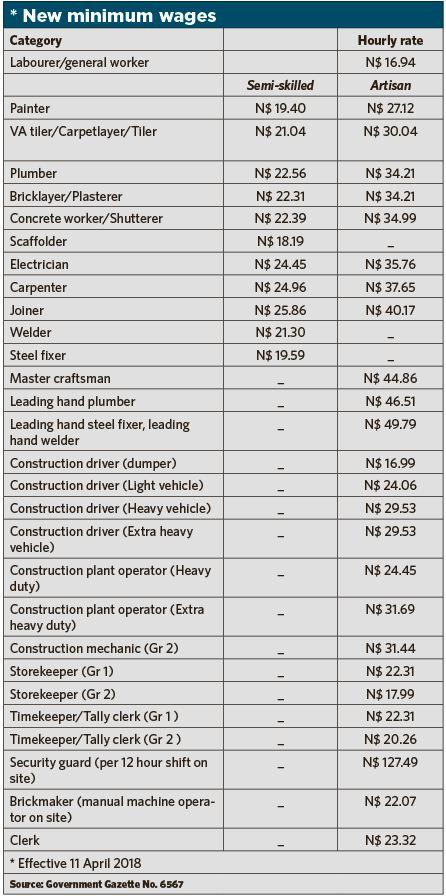Construction: New minimum wage now effective
Jo-Maré Duddy – The new minimum wage in the construction industry, which became effective last Wednesday, is 90c per hour higher than the one that has been in effect since the end of 2016.
The N$16.94 per hour minimum wage for labourers and general workers in the construction represents an increase of 5.6%. The average overall inflation rate in 2017 was 3.5%.
From 2015 to 2016, the minimum wage increased by N$1.45 per hour or 9.9%.
The new collective agreement, which was gazetted last week, was signed by the Construction Industries Federation of Namibia (CIF) and the Metal and Allied Namibian Workers Union (MANWU) on 16 November 2017.
With the promulgation of the collective agreement, the agreed minimum wage payable and the minimum employment conditions is extended by the minister of labour, industrial relations and employment creation, Erkki Nghimtina, to the entire construction sector, irrespective of the size of business and irrespective of who owns the business, the CIF said in statement.
Bärbel Kirchner, consulting general manager of the CIF, said it is important that there is no confusion. An increase of 5.6% on minimum wage payable is only relevant for certain selected positions, as per the collective agreement. It is also only includes an increase of the minimum wages that would need to be paid, she said.
“So, if an employer does not yet pay the minimum wage for selected positions, then they would need to increase the wage to ensure it reaches the minimum wage payable. If, however, the employer is already paying the minimum wage payable, then no further increase is required,” Kirchner said.
“This increase of the minimum wage payable therefore does not mean that it is an automatic increase for all. Provided the employer pays the minimum wage payable, any additional increase is totally discretionary, unless the employer had agreed to other arrangements, and that is ultimately largely determined by market forces.”
Tough times
Kirchner said the collective agreement between the CIF and MANWU was concluded after “arduous negotiations which included the threat of looming industrial action”.
“The CIF had emphasised that the construction sector had been hit severely by the economic downturn and since September 2016, has seen large-scale retrenchment in the entire supply chain. The CIF maintained the position that instead of hiking up the increase of only a few remaining employees, that one needed to make every effort to keep as many persons employed as possible.
“Sadly we have not seen any recovery in the construction sector since 2016. More businesses are being affected and more people are being retrenched. It is dire situation for our industry – businesses simply have no scope to further continue increasing labour costs without the generation of any revenue.”
According to Kirchner, the increase of minimum wage payable unfortunately still means that more persons will be retrenched if there are no immediate construction or building projects being advertised.
“Our industry needs work to survive. Our industry needs work to build our future,” she said.
The N$16.94 per hour minimum wage for labourers and general workers in the construction represents an increase of 5.6%. The average overall inflation rate in 2017 was 3.5%.
From 2015 to 2016, the minimum wage increased by N$1.45 per hour or 9.9%.
The new collective agreement, which was gazetted last week, was signed by the Construction Industries Federation of Namibia (CIF) and the Metal and Allied Namibian Workers Union (MANWU) on 16 November 2017.
With the promulgation of the collective agreement, the agreed minimum wage payable and the minimum employment conditions is extended by the minister of labour, industrial relations and employment creation, Erkki Nghimtina, to the entire construction sector, irrespective of the size of business and irrespective of who owns the business, the CIF said in statement.
Bärbel Kirchner, consulting general manager of the CIF, said it is important that there is no confusion. An increase of 5.6% on minimum wage payable is only relevant for certain selected positions, as per the collective agreement. It is also only includes an increase of the minimum wages that would need to be paid, she said.
“So, if an employer does not yet pay the minimum wage for selected positions, then they would need to increase the wage to ensure it reaches the minimum wage payable. If, however, the employer is already paying the minimum wage payable, then no further increase is required,” Kirchner said.
“This increase of the minimum wage payable therefore does not mean that it is an automatic increase for all. Provided the employer pays the minimum wage payable, any additional increase is totally discretionary, unless the employer had agreed to other arrangements, and that is ultimately largely determined by market forces.”
Tough times
Kirchner said the collective agreement between the CIF and MANWU was concluded after “arduous negotiations which included the threat of looming industrial action”.
“The CIF had emphasised that the construction sector had been hit severely by the economic downturn and since September 2016, has seen large-scale retrenchment in the entire supply chain. The CIF maintained the position that instead of hiking up the increase of only a few remaining employees, that one needed to make every effort to keep as many persons employed as possible.
“Sadly we have not seen any recovery in the construction sector since 2016. More businesses are being affected and more people are being retrenched. It is dire situation for our industry – businesses simply have no scope to further continue increasing labour costs without the generation of any revenue.”
According to Kirchner, the increase of minimum wage payable unfortunately still means that more persons will be retrenched if there are no immediate construction or building projects being advertised.
“Our industry needs work to survive. Our industry needs work to build our future,” she said.





Comments
Namibian Sun
No comments have been left on this article